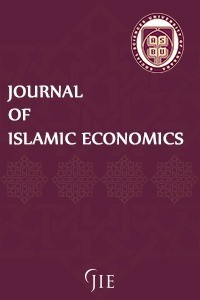Combining Contracts Together: An Analysis from Maqasid Perspective
Combining Contracts Together: An Analysis from Maqasid Perspective
Multiple Contracts, Combining Contracts, Loan, Shariah Objectives, Gharar Riba,
___
- Abozaid, A. (2004), Contemporary' Īna': Is it a Sale or Riba, Dar al-Multaqa, Aleppo.
- Abozaid, A. (2004), Fiqh al-Riba, Al-Risala Pulishing House, Beirut.
- Abozaid, A. (2018). Is Any Benefit from a Loan Prohibited in Islam, International Journal of Business and Management Studies, Vol. 7 No. 2, pp. 397-410.
- Abu Dawud, A. (1984), Sunan Abi Dawud, Al-Maktaba Al-Asriyyah, Beirut.
- Al-Asqalani, I.H. (1986), Talkhis al-Habeer, Dar al-Ma’rifa, Beirut.
- Al-Baiyhaqi (1414 H), Al-Sunan Al-Kubra, Dar Al-Baz, Makkah.
- Al-Haithami, A. (1414 H), Majma' al-Zawa'id wa manba' al-Fawa'id, Dār al-Fikr, Beirut.
- Al-Kasani, A. (1982), Badā’i‘ al-Ṣanā’i‘, Dār al-Kutub al-‘Arabī, Beirut.
- Al-Merghinani, B. (1980), Al-Hidaya, Dar Ihiya' al-Turath al-Arabi, Beirut.
- Al-Nasai’, A. (1991), Al-Sunan, Dar Al-Kutub Al-Ilmiyya, Beirut.
- Al-Saliḥ, Firas Aḥmad. Al-Bay' bi Si'r al-Souq fi al-Fiqh al-Islami, Journal of College of Sharia and Islamic Studies (JCSIS), (n.d.) Qatar University, vol. 37, issue 2, Qatar University, pp. 65-86.
- Al-Sana’ni, M. (1998), Subul al-Salam, Dar al-Kitab al-Arabi, Beirut.
- Al-Shafi'i, M. (1973). Al-Umm, Dar al-Ma'rifah, Beirut.
- Al-Shawkani, M. (1419 H), Nail al-Awtar, Dar al-Kalim al-Tayyib, Damascus.
- Al-Shirbini, M. (2003), Mughni Al-Muhtaj, Dar al-Fikr, Beirut.
- Al-Tirmidhi, M. (1999), Sahih Al-Tirmidhi, Dar Al-Hadeeth, Cairo.
- Ibn al-Arabi, A. (1995), Sharḥ Sunan al-Tirmidhī, Dar Ihya' al-Turath al-‘Arabi, Beirut.
- Ibn al-Qayyim, M. (1415 H), Tahzeeb Al-Sunan, Dar al-Kutub al-Ilmiyyah, Beirut.
- Ibn Hanbal, A. (1983), Al-Musnad, Mu’assat al-Qurtuba, Cairo.
- Ibn Qudamah, M. (1404 H), al-Mughni, Dār al-Fikr, Beirut.
- Ibn Rushd, M. (2014), Bidāyat al-Mujtahid wa Nihāyat al-Muqtasid, Dar al-Fikr, Beirut.
- Ibn Taymiyya (n.d.), Naẓariyyat al-‘Aqd, Dār al-‘Ilmiyya, Beirut.
- Qalyubi, A., and Umairah, S. (1995), Hashiyata Qalyubi wa Umairah, Dar al-Fikr, Beirut.
- Başlangıç: 2021
- Yayıncı: Ankara Sosyal Bilimler Üniversitesi
Historical Islamic Fiscal Solutions in Times of Crises and Its Contemporary Equivalences
Abdalrhman KHAİR, Mahmut BİLEN
Ibn Khaldun's Economic Theories Revisited
Abdullah AL MAMUN, Bahadir SİNANOĞLU, Muhammad Salah UDDİN
Milli İktisattan İslam İktisat Düşüncesine: Ekonomik Çağdaşlaşmada Özgünlük Arayışı
Development of Takaful Industry in Turkey: Challenges and Prospects
Combining Contracts Together: An Analysis from Maqasid Perspective
